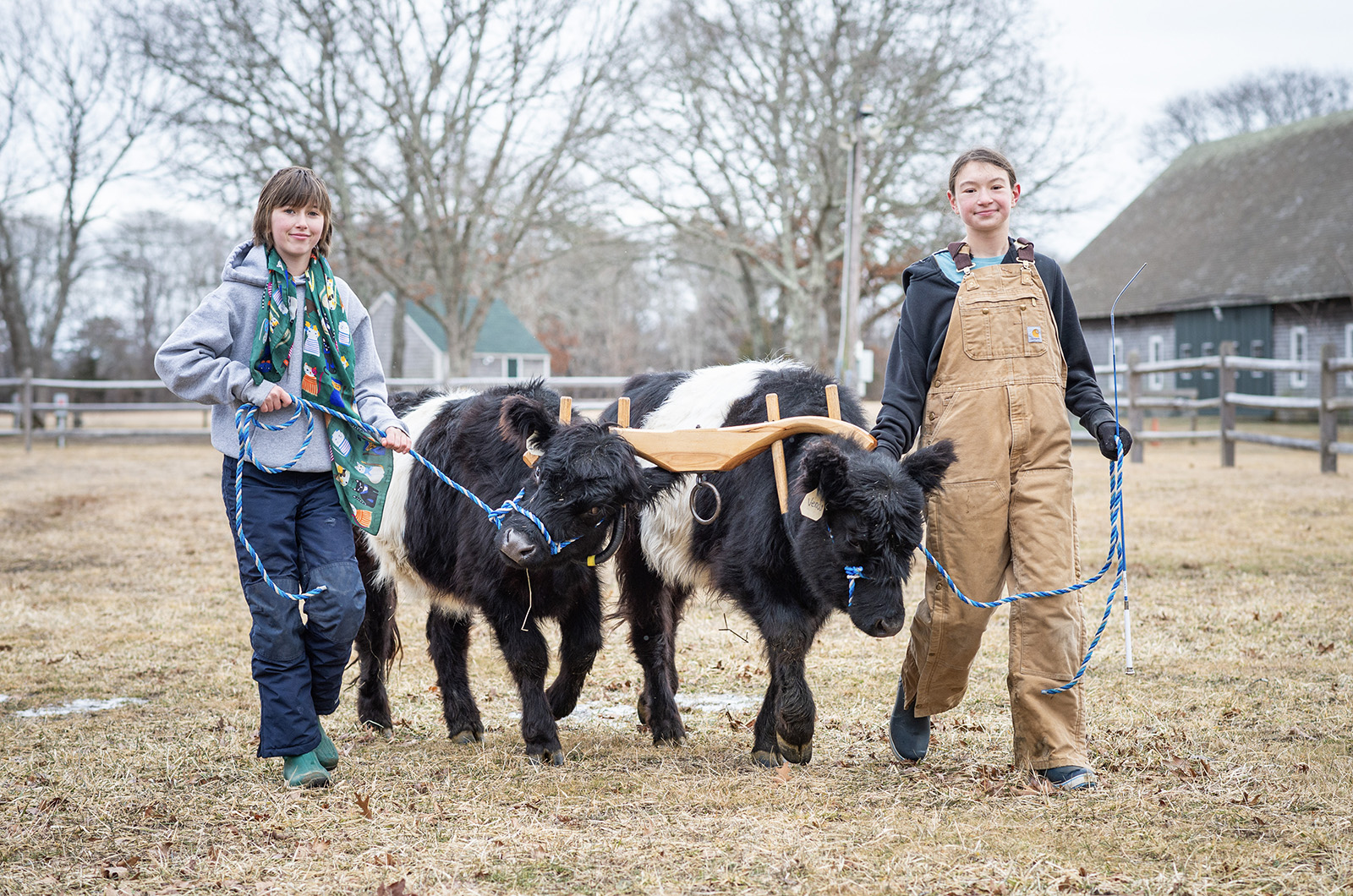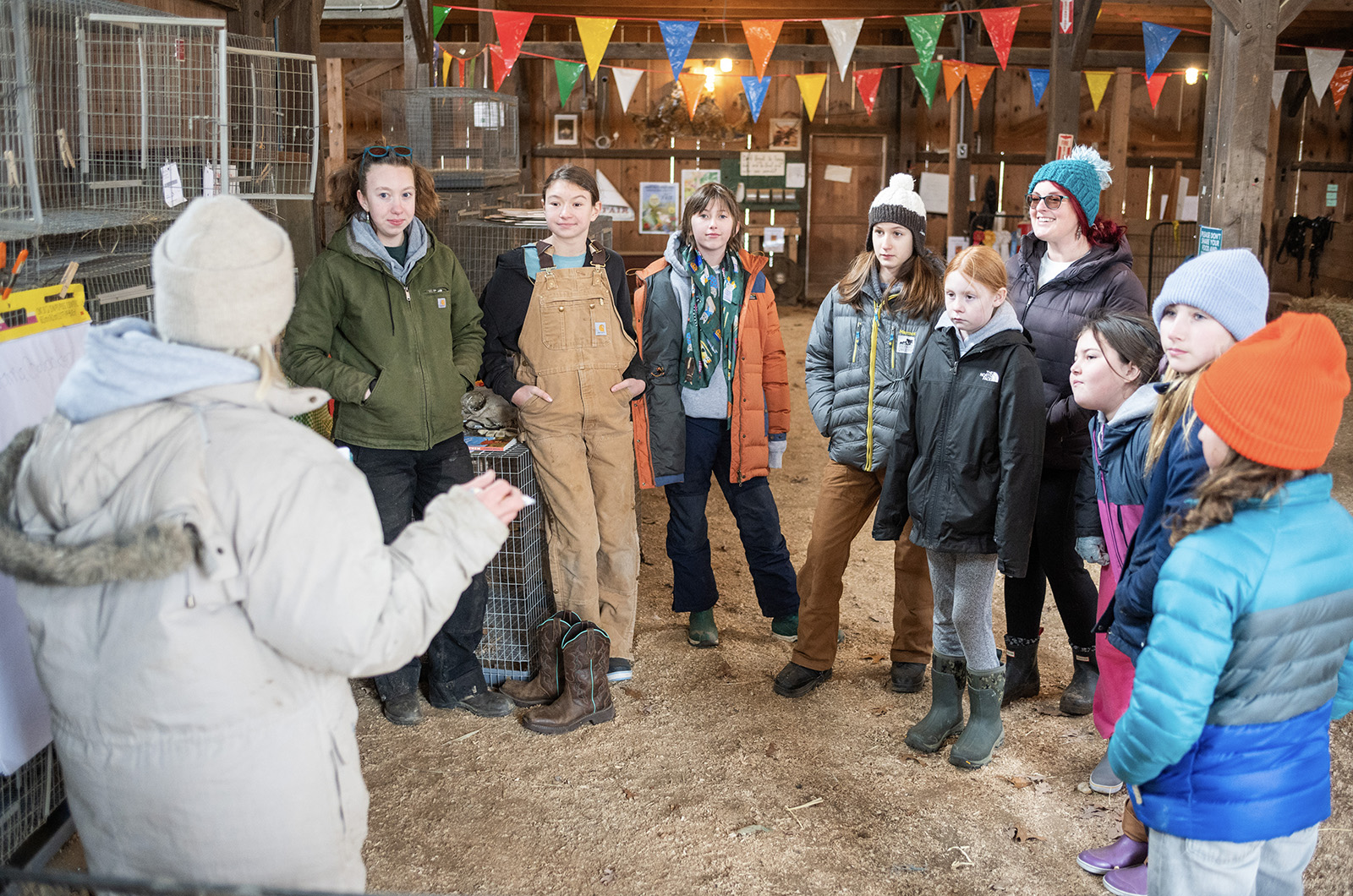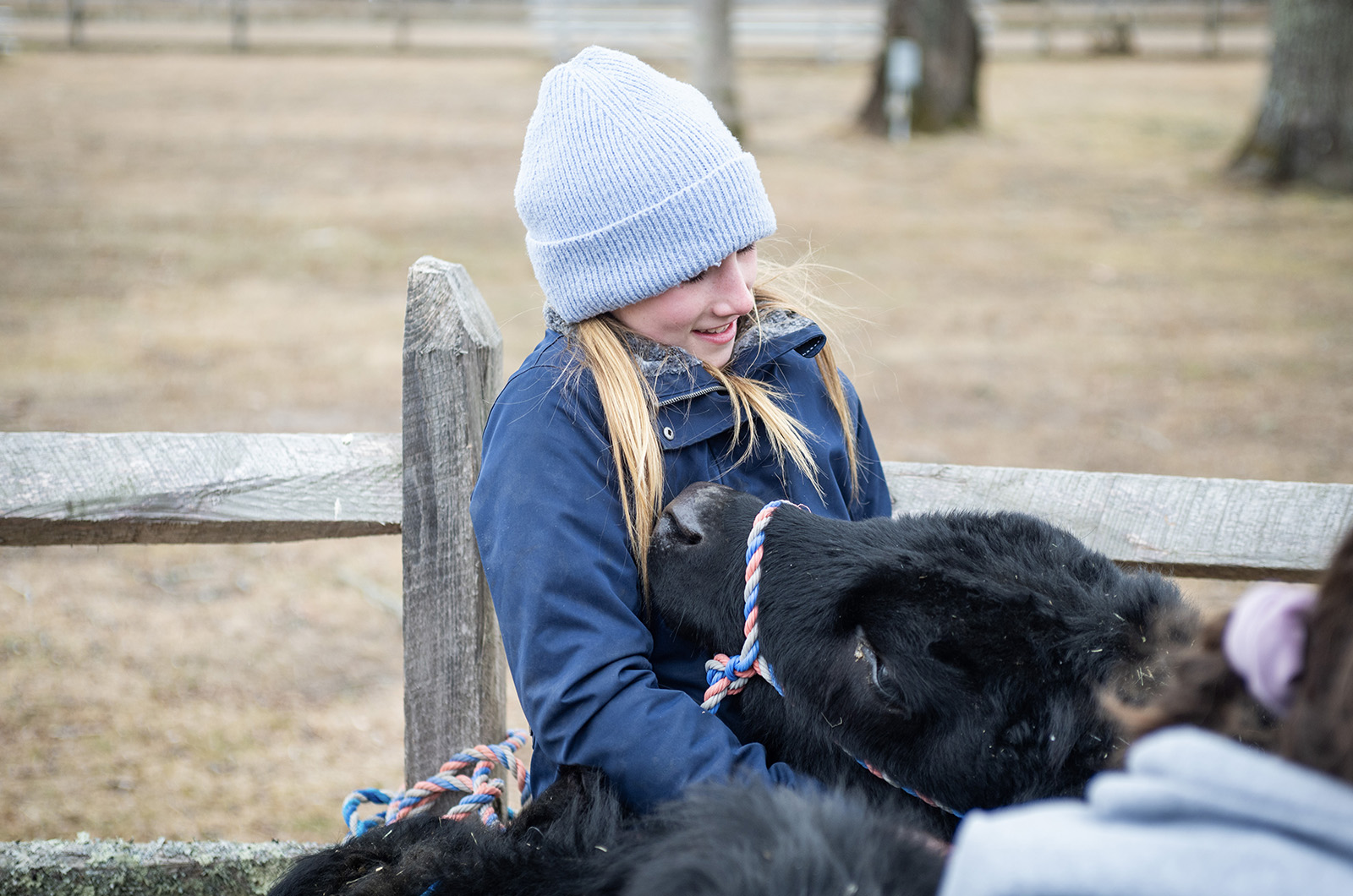While training a young Angus Cross cow named Bingo, 11-year-old Juniper Begin swung her leg over his thick black coat until she rested comfortably in the saddle. But Bingo had other ideas.
He bent his front legs until they touched the ground but kept his rump high in the air. Juniper had to quickly hop off before she slid down Bingo’s sloped body.
“He’s doing the downward cow,” Juniper said, giving a cheer and kissing his nose.
Juniper is a part of the Katama Cowpokes, a 4-H club on the Island. At the Martha’s Vineyard Agricultural Society barn, kids take morning and night shifts throughout the week, grooming and feeding five bovines, and cleaning their pens.
“I like being able to be around the animals and hang out with my friends while doing cow stuff,” Juniper said. “It’s just really fun.”
The national 4-H organization, administered by the U.S. Department of Agriculture, has taught more than 6 million children to use their head, heart, hands and health to strengthen their local communities. The Martha’s Vineyard Agricultural Society launched its first 4-H club in 2017. Since then, the program has grown in popularity among the Island’s youth. Roughly 80 kids are now part of 11 clubs, each with its own focus and guidance from volunteers from local farms and environmental organizations.
Julie Scott, the former co-president of the Agricultural Society board and executive director at Slough Farm, helped start Vineyard’s 4-H. She led the Island’s first club, the Cloverbuds, and now leads the Super Silos.
“I was the kid who was going to farms and animal shelters and being like, can I work here? Can I help you? Can I do something?” Ms. Scott said. “I didn’t really have anything like this where I grew up. I just love connecting children and farming.”
Many of the clubs focus on farming and food, and the 4-H kids often help grow vegetables and collect eggs on local farms. Ms. Scott said seeing the kids develop an intimate relationship with their food is one of her favorite parts of working with 4-H.
“They’re just so much more willing to eat something that they understand how it’s grown,” Ms. Scott said. Carole Soule, who owns Miles Smith Farm in New Hampshire, traveled to the Island for the first time in 2021 to present a team of oxen at the Agricultural Fair and fell in love with the farming community here, especially the 4-H kids. She now splits her time between New Hampshire in the summer and the Vineyard in off season. While here, she leads the Katama Cowpokes.
Ms. Soule described the kids as shy when they first joined the club, but teaching them to boss around bovines double their size brings them out of their shell.
“They are learning how to be confident, and can you imagine what that skill is giving them when they go out in the work world,” Ms. Soule said.
Ten-year old Leona Maloney listed some of the new skills she has acquired: “We have learned how to yoke cows, saddle them, train them, harness them, pull things.”
The kids are also working towards earning pins from the national organization, which awards members for their work, similar to Boy & Girl Scout badges.
Lucy Grinnan, the program and outreach manager for the Agricultural Society, has been coordinating 4-H since 2022. Grinnan said it’s not just about traditional farming.
“A lot of people think of 4-H as just being about agriculture and horses and cows, but it also includes a lot of different things.”
All 11 clubs have their own focus. For example, the Just A Pinch club teaches kids the basics of baking, the Animal Club at Allen Farm introduces kids to working with sheep, and the Crafts of Yesteryear club allows them to try their hand at collograph printmaking, needle felting, botanical dyeing and sewing.
Nina Ferry Montanile, the education and outreach manager for the Martha’s Vineyard Shellfish Group and leader of the Seashore Explorers club, said agriculture on the Island takes many forms.
“We wanted to get involved in 4-H because we’re aquaculture, and aquaculture is the farming of the ocean,” Ms. Montanile said.
On a recent Saturday, the Seashore Explorers and the Winging It club joined together to make oyster chowder and clam cakes at the Farm Institute. The kids learned how to shuck oysters and clams, gathered eggs from the farm’s hen house and cooked the meal themselves.
“Hello, I’m Mr. Clam,” a six year old said while opening and closing the first quahog she had ever shucked.
The kids proudly signed their initials on their shucked shells, with some planning to display them as trophies.
Catherine Hall, the leader of Winging It and the advancement coordinator for Sheriff’s Meadow Foundation, said 4-H gives kids awareness about the land they call home and the creatures who also live there. Her group goes on hikes where they learn about foraging and wildlife.
“I think it’s really eye opening for them...” Ms. Hall said. “It’s a small Island, but a lot of kids haven’t been to many of the places. So for us, it’s an access point, not just for shellfishing and wild harvest, but to come to this beach in Aquinnah that [they] might not otherwise have a chance to go to.”
Teaching kids how to engage with the natural world is what Lynne and Allen Whiting focus on at the Paint Club. The couple farm their land in West Tisbury and own the Davis House Gallery on the property, which displays Mr. Whiting’s artwork.
“Going out in the [day] when it’s quiet, sheep are fed, everybody’s happy and it’s peaceful, is magic,” Mr. Whiting said.
He and his wife hope to bring that magic to their club members and teach them how to communicate through art.
“I enjoy watching kids make the connections,” Ms. Whiting said. “I think making the connections between what the earth gives us and taking care of [it], through animal husbandry, through agriculture, through gardening, it’s all connected, and I think it makes healthier, happier kids.”
4-H has both a fall and spring season with clubs for kids aged 5-15. Registration for the spring opened in January but there are available spots on the Agricultural Society’s online store. It costs $40 for the whole year.








Comments (2)
Comments
Comment policy »